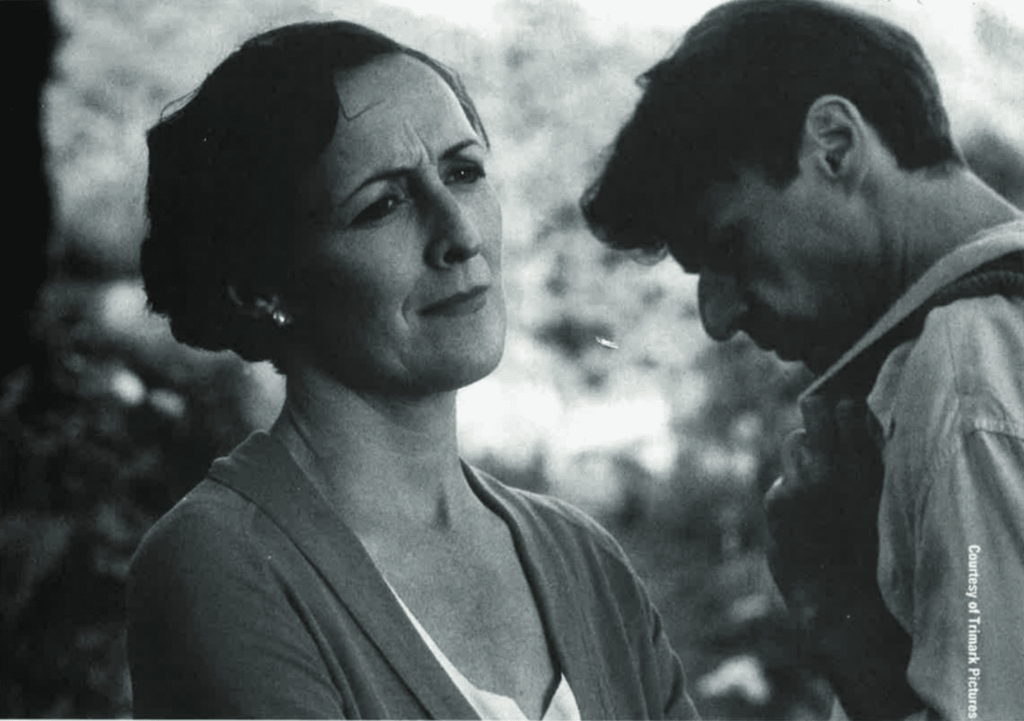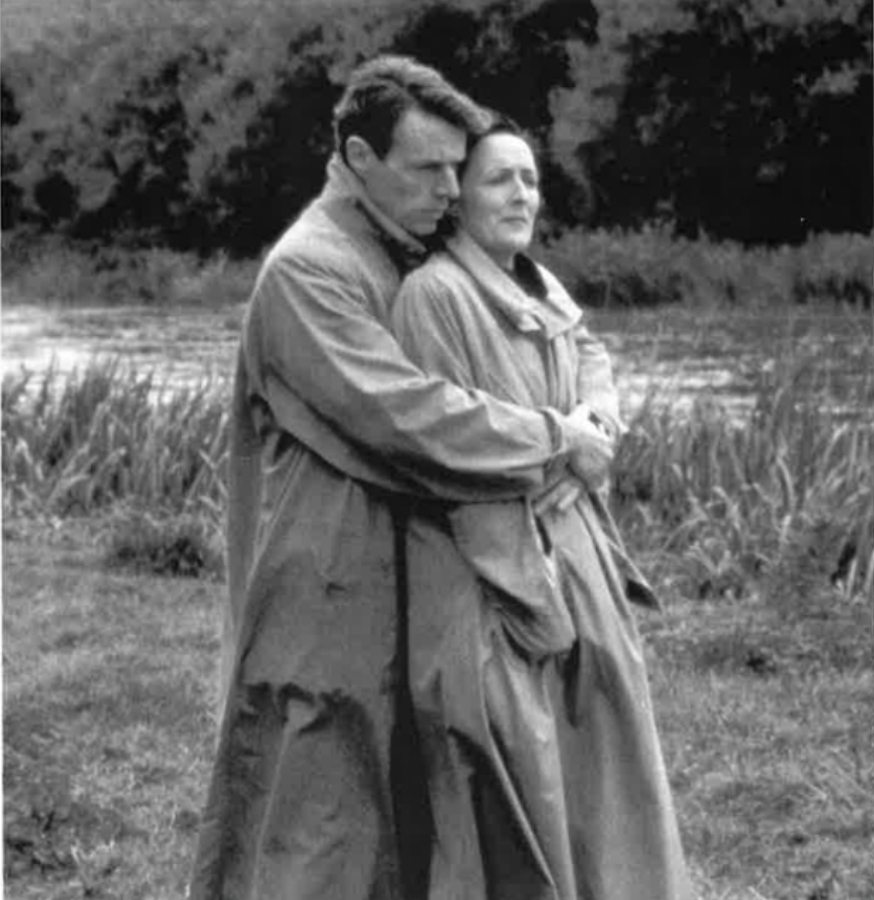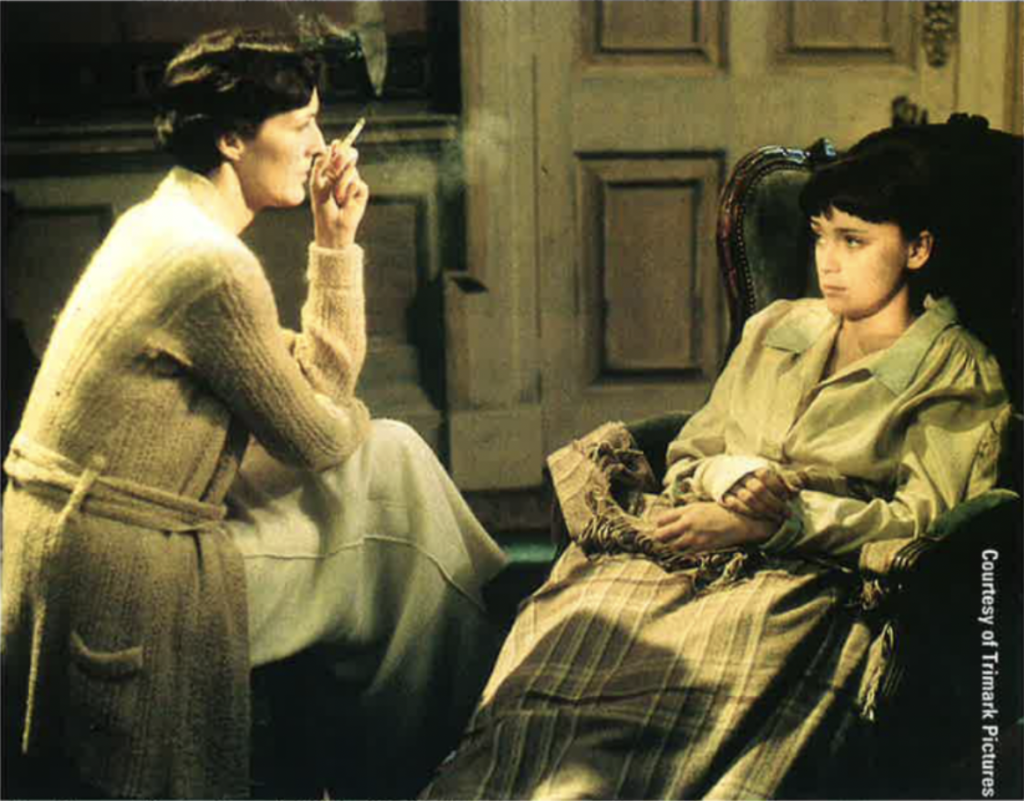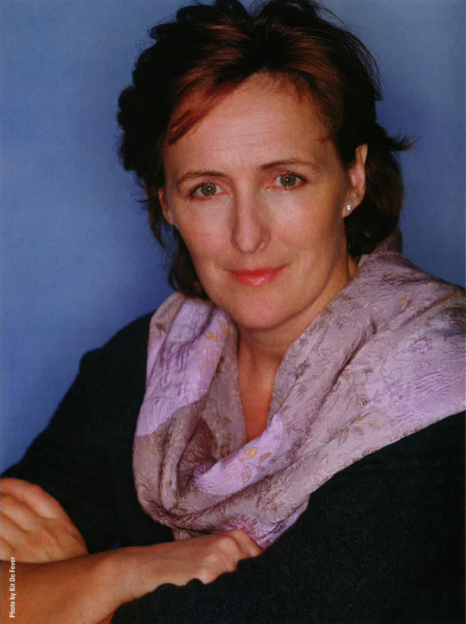She says she’s jetlagged, that her head feels as if an arrow is piercing both temples, but Fiona Shaw is the picture of vitality. She strides into the lobby of the Lombardy Hotel in New York City, her long brown coat swinging behind her. The hair that often appears close cropped in publicity photos is a little longer now, sweeping back from her face in soft brown waves. She’s quite beautiful, with fine, chiseled features dominated by expressive, downturned grey-green eyes. There’s a trace of a Cork accent in her greeting, then it’s gone.
She’s only in New York for one day, to participate in a celebration of Virginia Woolf at Town Hall. She’s flying back to London tonight, after drumming up publicity for her recent film The Last September based on the novel by Elizabeth Bowen and directed by Deborah Warner. Set in Cork, Ireland in 1920, the film explores the decline of the Anglo-Irish ascendancy against the backdrop of the Anglo-Irish War and stars such theatrical luminaries as Maggie Smith, Michael Gambon, and of course, Shaw herself, arguably the finest classical actress of her generation.
The idea for the film actually came from the Irish director Neil Jordan when he and Shaw were working together on The Butcher Boy. Shaw recalls, “We were having dinner one night, and he said, `I’ve got this film and I haven’t time to make it. Who could make it?’ And I said, `Have you thought of Deborah?’ And he said, `Yes, I saw Hedda Gabler. Maybe she should do it.’ And he asked her. It’s as simple as that. I might not have been in it.”
That Shaw might not have been cast hardly seems likely, considering her longtime collaboration with Warner in the theater. The two have worked together for ten years and Warner readily credits Shaw as her muse. Referred to in theater circles as “the terrible twins” they have generated some of the most exciting moments the theater has known in recent times. As journalist John Heilpern points out, “mundane is not in their vocabulary.”
Shaw’s adaptation of T.S. Eliot’s poem The Waste Land under Warner’s direction was hailed by The New York Observer as “an unreal achievement by the greatest actress you could see either side of the Atlantic.” Running at 37 minutes, and staged in New York in 1996 at the derelict Liberty Theater, the show was a tour de force. The run was extended by popular demand and won the New York Drama Desk Award for Most Outstanding Theatrical Event. Shaw’s interpretation of Ibsen’s Hedda Gabler, again under Warner’s direction, is generally agreed to be the greatest in memory and her 1988 portrayal of Electra was described as “shattering.”
Warner describes Shaw as “an extraordinary combination of searing intellect and structured thought and an immensely visceral performer with great emotional breadth.” She has won three Olivier Awards (London’s equivalent to the Tony Award), a London Critics Award and the Evening Standard Drama Award for Best Actress.
Yet, for one who has made such a brilliant career in the theater, Shaw has been known to proclaim her distaste for her field. “I loathe the theater when it’s pleased with itself and when it stays in one shape,” she explains. “The difficulty with the theater is trying to find out what to do next, and people often don’t need to find out what to do next because they go on doing what they’ve just done.” Warming to her theme, she continues, “Maybe there will be some who will say, `That is the nature of all institutions. You have to allow them to go on being what they’ve been for a while before they decide what they can be next.’ But I find that very frustrating because we have in England a very, very complacent theater that has decided what it is. It becomes obsolete, of course. As soon as you make a policy, a philosophy, it’s dead.”

Photo courtesy of Trimark Pictures
Fiercely intellectual, she speaks at breakneck speed, her speech furiously trying to keep pace with her racing thoughts. Sentences often trail off as her mind leaps to the next thought. She could never be accused of being succinct. “This is not to decry tradition,” she continues. “There are fantastic skills because of the tradition. That’s the problem with conservatism. Conservatism looks after skills and that’s terribly important — the skills of language and rhythm and history and knowledge and a sort of osmosis of knowledge. I’m a funny mix, really, of being very much for the discipline of the inherited form, but repetition is killing, really…repetition is the killer.”
It’s a dissatisfaction she shares with Warner and which prompts them to take such risks with the theater. Speaking on the phone from her home in London, Warner clarifies Shaw’s point. “We’re dissatisfied with knowing the shape of theater,” she explains, referring to the traditional structure and presentation of plays. “Theater has to offer a new shape that one won’t recognize the terrain of. When one can throw away the map, that’s when it gets exciting. Theater should be exhilarating. A new play is something I wouldn’t recognize…the form is where we’re frustrated.”
An example of what they mean was their 1995 production of Shakespeare’s Richard II with Shaw cast as the king. In making such a radical casting choice they hoped to shed a new light on King Richard and his relationship with Bolingbroke. An image they both use in discussing theater is the idea of “breaking the play open,” tossing aside tradition and adding some unconventional element that will hopefully bring a whole new meaning to the text. Critical reception of their Richard ranged from rapture to outrage.
In discussing Shaw’s career and the risks she hats taken as an actress, Warner maintains, “She’s as brave as anything. She’s unguarded in her exploration of the theater.” It’s a process Warner likens to free-falling.
Further proof of Shaw’s bravery is that she has become an actress at all. Born in Cobh, County Cork, she recalls that her childhood environment was hardly conducive to a life in the theater. Her father is an eye surgeon, who Shaw describes as very strict, and her mother is a physicist who, she laughs, “cannot work a toaster.” Out of four children, she was the only girl. Two of her brothers are alive today. The youngest was killed in a car crash when he was eighteen.
Her childhood sounds like something out of a John McGahern story. “I was brought up a mile from my school. My brother’s school was across from my school, and my father’s private rooms [office] were across from his school. I went to university which was two miles from where I was brought up, and my father’s hospital was across the street from university. I was given five pounds a week pocket money at university, which was enough to buy about one and a half pints of Guinness and my lunch.” It was an environment she describes as utterly devoid of any theatrical stimulus. She was involved in the local amateur dramatic society and performed recitation and scenes from plays at the Cork feis. “I never knew what the rest of the play was,” she points out.
Still, she recalls about her acting, “I couldn’t stop doing it, and working at it and thinking about it. But I had absolutely no point of contact.
“When I went to drama school in England I was stunned at my inadequacy in relation to all those who had been annually taken to Stratford-on-Avon and knew every Shakespeare play. When I opened at Stratford on-Avon I had never seen a Shakespeare play.”
When asked why she left Ireland, she pauses for a moment before replying, “I think I’m the last era generation who were bred for export.” She reconsiders her words. “Not bred for export…All the people who hadn’t been to university left because they had to get jobs, and all the people who had been to university left…because they had to get jobs. There weren’t any in Ireland. By the late seventies and early eighties Ireland was in a state of permanent depression. We didn’t know that. We thought everywhere else was rather cruelly progressive.”
She continues, “I wanted to go to drama school, so I had to go to England. There was no school in Ireland. I had every intention of going home. I didn’t know I was going to stay.”

Photo courtesy Trimark Pictures
For one who has enjoyed such professional success, it comes as quite a surprise to hear her say, “I envy the people who don’t have to go. Once you’re gone you can never go back. It’s a fantastic country. The people under thirty now have this fantastic country, the highest growth economy in Europe along with a beautiful place to live — a really magical land.”
Shaw is hardly wistful, however. “I don’t regret it,” she says of her decision to leave Ireland. “I did absolutely the right thing at that time.”
In much of Shaw’s recollection, the presence of her father looms large, and indeed, his disapproval of the acting profession was a great stumbling block she had to overcome. She wanted to go to acting school, he wanted her to go to university and earn a degree. So they struck a deal: he would pay for drama school if she earned a degree. “So I did my time,” she admits. “I sort of went dragging a ball and chain and did a degree in philosophy, feeling, literally, I was wasting my time. Of course I wasn’t,” she continues, “and I am of course grateful — I’m very grateful to have been a bit later starting. It’s better to start later.
“It’s a miracle, actually, I ever got to drama school,” she points out, playing down her determination.
Drama school proved to be none other than the prestigious Royal Academy of Dramatic Arts, and it was there that Shaw finally came into her own. “When I did get into drama school I felt a sort of firework in my back. I really think I was reborn. I think I literally started a new life. Even though I’m very connected to my family, it is, literally, like two lives and I do think I’ve shed the other one.”
But things were not easy at first. The only Irish person at RADA, and with no formal training, she lagged behind for the first year and a half. “I couldn’t get my bearings at all. Everyone else in my class was miles ahead,” she recalls. London was also a far cry from parochial County Cork. “I was brought up in the eighteenth century,” she states. “The punk movement had come and gone [in London] and I had never worn anything but a tweed skirt!”
It was in her fourth term at RADA that everything changed for her. “I excelled at poetry and I was very good at eighteenth-century comedy,” she explains, “and in the fourth term they do eighteenth-century comedy at RADA, and I just went phhht!” her hand zooms upward. “Amazing,” she recalls. “I just took off. I got it. I sort of got it, like Eliza Doolittle, in one moment. I knew suddenly where I was in eighteenth-century drama, and once I knew that, everything that had ever happened until then suddenly made sense.”
All of a sudden Shaw was RADA’s golden child, showered with awards like the Bancroft Gold Medal and the Ronson Award for Most Promising Pupil. She auditioned for the Royal National Theatre and was promptly cast alongside Tim Curry and other leading lights of London’s theater world in a production of The Rivals. “I just walked into London megastardom in one step,” she states. The fact still seems to amaze her.
Four years with the National Theatre and the Royal Shakespeare Company followed and she has worked regularly ever since, making several forays into film as well. Along with The Butcher Boy and Last September, she has appeared in Three Men and a Little Lady, Mountains of the Moon, Persuasion and The Avengers.
In reflecting on the seeming ease with which her career developed, she points out, “My straggles were earlier. My straggles were to get there in the first place. My struggles were to overcome a profound sense of `I’m never going to get to a drama school in England,’ and to overcome my family’s aversion to the notion, particularly my father’s disapproval of it. The push is enormous; then actually the next bit, the thing you think is going to be hard, is not.”
Shaw has seized her new life with the same ferocity that she manifests onstage. British Vogue has described her as “someone who engages at full tilt…a life force.” She loves adventure and travel — she has traveled to Albania to help establish a national theater there — and no new sensation or impression seems to escape her. She takes nothing for granted. Lacking pretense, she is delightfully ironic. It’s hard to put a finger on the source of her magnetism. It’s equally hard not to succumb to it. She quite unself-consciously consumes your attention.
When she’s not acting, she’s thinking about her next role or project. “I don’t think I have hobbies,” she observes. “I think hobbies are for people who live proper lives. They do something on weekends. I don’t have weekends.
I used to play tennis. I run, but that’s not a hobby. I do that because I have to,” she laughs. “I’m always puttering at something…in fact avoiding work. I’ve spent many an hour avoiding that.”

Photo courtesy of Trimark Pictures
She’s in a particularly peripatetic phase of her life now — her London apartment serving as little more than a stopover. When she finishes this publicity tour she and Warner are off to Dublin to begin rehearsals for Medea, Euripides’ tale of a woman who has been betrayed by her husband and her adopted country and wreaks a horrible revenge. “Once I start that, I’ll have no life at all, nothing, nothing…but in a kind of fantastic way. You suspend all activities, all anxieties, all responsibilities.”
In reflecting on the tragic magnitude of her upcoming role, Shaw pauses for a moment, and her eyes take on a sadness. “It’s not altogether pleasant, what the next few months hold for me. And I didn’t want to do Medea for a long time, because I didn’t want to go there. It’s terrifying.” She harbors no illusions that this performance might serve a greater societal good. Once again it is about exploring the boundaries of theater. “I do feel there’s no virtue about it,” she maintains. “It’s just if you’re going to act the thing, you have to act the thing. But I don’t feel any kind of `saving the audience,’ not at all. But if you’re going to do it well…”She pauses as she jumps to a new thought. “Ugh!” she exclaims, “I dread it!
“As my father says, `Why don’t you do a normal play?’ It’s very confusing…a normal play. They’re not normal. It’s about the abnormal — that’s what we’re doing.” She’s not kidding. After Medea, she’s off to shoot a film about Virginia Woolf. Richard II, Hedda Gabler, The Waste Land, Medea and Virgina Woolf — it takes a certain bravery to explore the dark recesses of the mind that inhabit these characters, an exercise of the sheer force of will that has made her an actress after all.
I remind her that the year she left for England, 1980, was the same year that Bobby Sands led the hunger strikes in the Maze Prison. When asked how the Troubles impacted her life, she replies, “We were very neutral about it. There was lots of talk over the table about it but there was no question of being actively involved.”
“Oh, my great-uncle had been in the old IRA, so there was a time when my family was involved, but not, of course, in my time. We were maybe protected from it, I mean now that I look back on it, maybe it was the Church. The Church had no vested interest — it didn’t want to empower people to be political. So we were good holy Catholic girls and did tennis on Saturdays and did our lessons and did our exams. Honestly I can’t tell you how in a bubble we all were. So it wasn’t that we ignored the problem, it was daily a part of our news, but it was something out of our control because it was an English problem. We had accepted the state of affairs.”
But she’s not so neutral after all. As she continues, her voice takes on a certain vehemence. “To this day I think it’s interesting that the English perceive that they are helping the Irish out with an Irish problem. It is their problem. They made it, they own it, it’s theirs — until they solve it. I think they’ve finally got that message, haven’t they? And I think, `Good enough. How dare you think you can solve it with a couple of “taking off your jackets and sitting up overnights”?'” She later admits, “I have an illogical desire, like most people, an illogical, emotional, inherited, brainwashed, romantic notion that it would probably be better if the country was unified. And I think it will be. And I think it will possibly be better for all concerned.”
She still goes back to Ireland for Christmas and she was awarded a professorship at University College Cork, where she is helping the university develop its fledgling drama program. She is also interested in buying a house there. “But I don’t really go back,” she reflects. “My life is terribly full in the world that I live in. I mean, in that way, I don’t really live in England either. You live in the world of the theater — you’ve found a neighborhood. Full of very nice people, actually, but they’ve all jumped ship in some way. It’s a giant sort of orphanage. It’s very like a religious order in a way without having any religion.” Given the level of her devotion, one could easily argue that the theater is her religion.
“I think I’ve landed in a lovely world,” she observes. “To do the thing you want to do is fantastic, isn’t it?”
As our interview winds down, she asks, “Who’s your readership?”
“Irish Americans,” I remind her.
“Of whom I’m related to half of,” she realizes. She leans into the tape recorder and announces, “And I love all my family in America. They’re great. They’re great.”
Editor’s Note: This article was originally published in the June/July 2000 issue of Irish America.


Leave a Reply